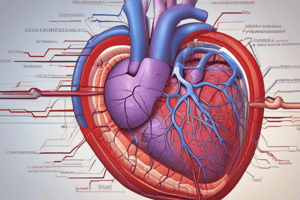Podcast
Questions and Answers
What is the typical heart rate associated with SVT?
What is the typical heart rate associated with SVT?
- 50-60 beats per minute
- 80-100 beats per minute
- 60-80 beats per minute
- 100 or more beats per minute (correct)
Individuals of any age can experience SVT.
Individuals of any age can experience SVT.
True (A)
What is one method used to diagnose SVT?
What is one method used to diagnose SVT?
Electrocardiogram (ECG)
A common type of SVT is _____ fibrillation, which involves irregular electrical firing in the atria.
A common type of SVT is _____ fibrillation, which involves irregular electrical firing in the atria.
Match the following types of SVT with their characteristics:
Match the following types of SVT with their characteristics:
Which of the following could potentially trigger an SVT episode?
Which of the following could potentially trigger an SVT episode?
Cardioversion uses medications to restore normal heart rhythm.
Cardioversion uses medications to restore normal heart rhythm.
Name one symptom of SVT.
Name one symptom of SVT.
Vagal maneuvers can help to _____ the heart rate in some SVT cases.
Vagal maneuvers can help to _____ the heart rate in some SVT cases.
What is the primary treatment method for managing persistent SVT?
What is the primary treatment method for managing persistent SVT?
Flashcards
What is Supraventricular Tachycardia (SVT)?
What is Supraventricular Tachycardia (SVT)?
A rapid heartbeat originating from the atria or the sinoatrial (SA) node of the heart, typically exceeding 100 beats per minute.
What is Atrial Flutter?
What is Atrial Flutter?
A type of SVT characterized by rapid, regular atrial contractions.
What is Atrial Fibrillation?
What is Atrial Fibrillation?
A type of SVT involving irregular, often rapid electrical firing in the atria, leading to an irregular heartbeat.
What is AV Nodal Reentrant Tachycardia (AVNRT)?
What is AV Nodal Reentrant Tachycardia (AVNRT)?
Signup and view all the flashcards
What is AV Reentrant Tachycardia (AVRT)?
What is AV Reentrant Tachycardia (AVRT)?
Signup and view all the flashcards
What are Palpitations?
What are Palpitations?
Signup and view all the flashcards
What is an Electrocardiogram (ECG)?
What is an Electrocardiogram (ECG)?
Signup and view all the flashcards
What is Cardioversion?
What is Cardioversion?
Signup and view all the flashcards
What is Ablation?
What is Ablation?
Signup and view all the flashcards
What are some Triggers for SVT?
What are some Triggers for SVT?
Signup and view all the flashcards
Study Notes
Introduction to SVT
- SVT stands for Supraventricular Tachycardia.
- It's a rapid heartbeat originating in the atria or the sinoatrial (SA) node of the heart.
- This rapid heart rate is typically more than 100 beats per minute (BPM).
- SVT can occur in individuals of any age, although it's more common in younger adults.
- Prompt treatment usually prevents lasting damage, and the underlying cause is often identified and addressed.
Types of SVT
- Atrial flutter is a type of SVT, characterized by rapid, regular atrial contractions.
- Atrial fibrillation is another type, involving irregular, often rapid electrical firing in the atria.
- AV nodal reentrant tachycardia (AVNRT) is a common type, arising from a circuit in the AV node.
- AV reentrant tachycardia (AVRT) involves a circuit involving accessory pathways, extra electrical pathways between atria and ventricles.
Symptoms of SVT
- Palpitations (racing or fluttering heart) are key.
- A rapid pulse is often noticeable.
- Chest pain, dizziness, shortness of breath, or lightheadedness can occur.
- Anxiety or nervousness may accompany SVT.
Diagnosis of SVT
- Physical exam (listening to the heart with a stethoscope) assesses heart rate and rhythm.
- Electrocardiogram (ECG) captures the heart's electrical activity, vital for diagnosis.
- Holter monitoring records heart activity over 24 hours.
- Event recorders detect rhythm disturbances as they occur.
Treatment for SVT
- Vagal maneuvers (carotid massage, Valsalva) may slow heart rate.
- Medications (beta-blockers or calcium channel blockers) control heart rate.
- Cardioversion (electrical shocks) restores normal rhythm.
- Ablation creates scar tissue to block abnormal pathways.
Causes of SVT
- Underlying heart conditions can cause SVT.
- Dehydration, stress, caffeine, or stimulant use can trigger episodes.
- Some medications may increase SVT risk.
- Irregularities can occur in a healthy heart.
Associated Conditions
- SVT can be linked to underlying heart conditions.
- Coronary artery disease and other conditions can present with SVT.
- Underlying structural heart problems can lead to SVT.
Management of SVT
- Managing SVT involves lifestyle adjustments and medical interventions.
- Avoiding stimulants (caffeine, alcohol) and managing stress is important.
- Adherence to prescribed medications and regular doctor follow-ups are crucial.
Prognosis
- Most SVT cases are treatable, with excellent long-term outcomes.
- Proper diagnosis and treatment allow for healthy lives.
Studying That Suits You
Use AI to generate personalized quizzes and flashcards to suit your learning preferences.
Description
This quiz covers the basics of Supraventricular Tachycardia (SVT), including its definition, types, and symptoms. Learn about different forms of SVT such as atrial flutter and atrial fibrillation, and understand the implications of rapid heartbeats and their underlying causes. Perfect for those studying cardiology or health sciences.




